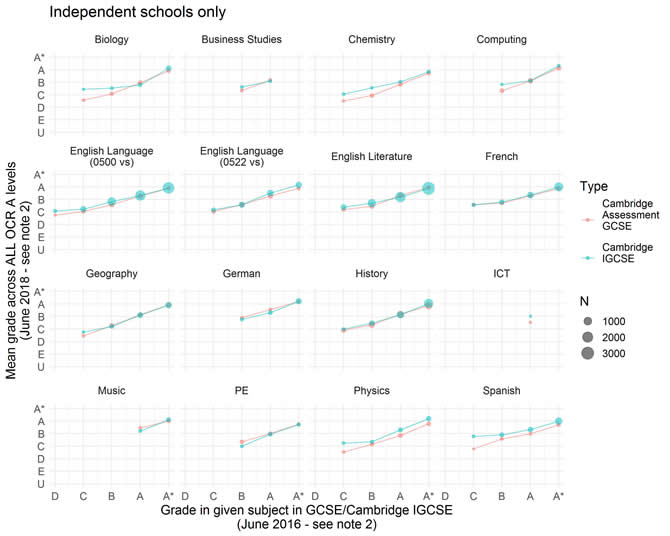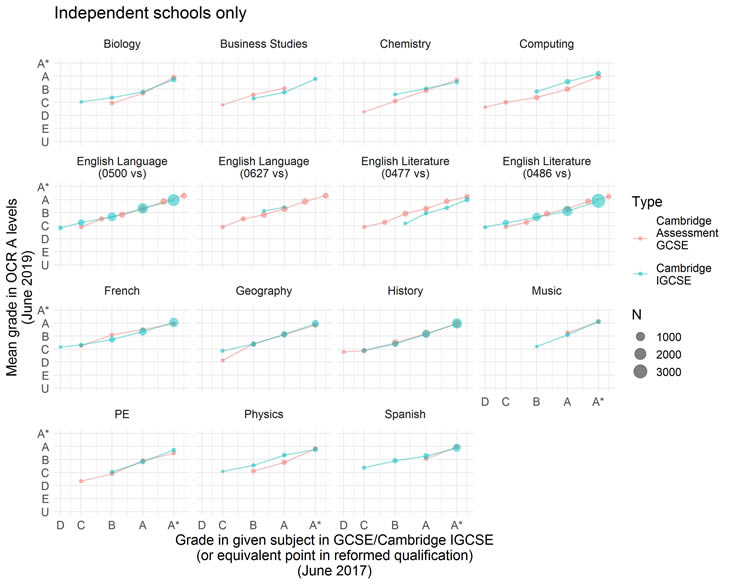We’ve been taking a look at our data to see how well our Cambridge IGCSE students do after completing their Key Stage 4 studies. We wanted to see if there was any evidence that, as some have suggested, IGCSEs are 'easier'?
The analysis is based on the most up-to-date data available, held internally by Cambridge Assessment. To begin with, we identified students who had taken either Cambridge Assessment GCSEs or Cambridge IGCSEs in June 2016. Then, using the centre and candidate numbers that are supplied as part of the examination process, it was possible to identify which of these students had also progressed to take any A levels with OCR in June 20181. Only subjects where at least 200 students taking Cambridge IGCSE also went on to take A levels are included in the analysis.
Students’ overall achievement at A level was quantified by taking a mean of the grades they achieved across all of the A level subjects they took. For the purposes of calculating a mean, A level grades were treated as numeric values (i.e. A*=6, A=5,…,E=1,U=0).
Figure 1 shows the average achievement at A level for each grade in each individual subject at GCSE or Cambridge IGCSE for students in UK independent schools. Specifically, for each grade in each subject, it compares the mean overall A level achievement of candidates achieving the relevant grade in a Cambridge IGCSE (the blue line and points) to the average achievement of candidates achieving the same grade in a GCSE (the red line and points). Only grades where at least 20 GCSE and at least 20 Cambridge IGCSE matched candidates could be identified are included in the chart.
As can be seen, students taking Cambridge IGCSEs went on to perform at a similar level or better at A level on average than students achieving the same grades in GCSEs. Specifically, for three quarters of the subject grades in Figure 1 (40 out of 55) the performance of Cambridge IGCSE students exceeds that of GCSE students. The exact reasons for the improved performance of Cambridge IGCSE candidates at A level are not known. However, such a result is the reverse of what we’d expect if Cambridge IGCSEs were ‘easier’. If Cambridge IGCSEs were easier and students were being awarded grades they did not deserve, then we would expect to see them struggle when progressing to take the reformed UK A level. In fact, on average, Cambridge IGCSE students perform better at A level.
In other words, looking at progress to A level suggests a good level of comparability between GCSEs and Cambridge IGCSEs.

Figure 1: Progress from Cambridge Assessment GCSEs and Cambridge IGCSEs to A level within UK independent schools.
Note 1: Our analysis uses Cambridge IGCSE and OCR data; although we have used OCR data only, Ofqual’s regulatory processes focus on ensuring consistency across the standards in GCSE and A Level provided by different boards. Qualifications referred to as ‘international GCSEs’ or ‘IGCSEs’ also are available from other boards and are not included here. We make no assumptions that other qualifications called ‘IGCSEs’ have the same characteristics – we do not have the data from these other qualifications and cannot include them in any analysis.
Note 2: Our analysis tracks progression from GCSE to A level, showing outcomes of GCSE and Cambridge IGCSEs taken in June 2016; reformed GCSEs were available in maths and English in 2017, and a wider range of subjects in 2018. Ofqual has put in place rigorous processes (principally ‘comparable outcomes’) to ensure that standards have been carried over from the old GCSEs to the reformed GCSEs. We cannot yet do the progression analysis on reformed GCSEs since we do not yet have A level grades for these students, but will do this as soon as we have the data from the June 2019 A level session.
UPDATE: October 2019
We now have data from the 2019 A level session and the promised progression analysis is shown in Figure 2 below. One slight change from the earlier analysis is that, because reformed qualifications are reported on the 9-1 scale, not all of the points on the chart are positioned to line up with the A*-G scale on the x-axis. Please see further details on how the two grade scales have been positioned against one another.
The pattern is fairly similar to the earlier analysis of progression from 2016 to 2018. Overall, where comparisons are possible, 27 out of the 48 Cambridge IGCSE points displayed (56 per cent) are above the progression line for GCSEs (i.e. for the given grade in the given subject, those taking Cambridge IGCSEs outperformed those with the same grade in GCSE on average). One clear exception to the general pattern is for the Ofqual-regulated Cambridge IGCSE in English Literature (0477) – but it is important to appreciate that this is a very low-entry syllabus; the amount of available data for this specification was 20 times smaller than for the other Cambridge IGCSE English Literature (0486). All of the other Cambridge IGCSEs in English and English Literature are compared to reformed GCSEs and display similar levels of progression to A level.

Figure 2: Progress from Cambridge Assessment GCSEs and Cambridge IGCSEs in summary 2017 to A levels in 2019 within UK independent schools. The size of different points on the chart relates to the amount of available data.
1. Note that students who switch schools between GCSE and A level would not be matched and so would not be included in this analysis.↩
Tom Benton
Principal Research Officer, Cambridge Assessment
You may find these links useful for more information about IGCSEs:
Are IGCSEs easier than GCSEs? – A response from Cambridge Assessment
Independent Education Today - GCSE v IGCSE: the debate continues
Schools Week - Don’t blame independent schools for choosing IGCSEs